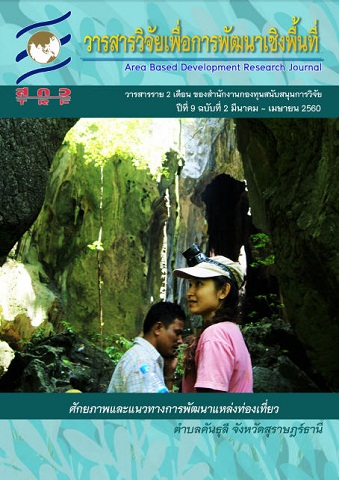ความสำคัญของหลักประกันสุขภาพถ้วนหน้าต่อประเทศไทย 4.0
Main Article Content
Abstract
ประเทศไทย 4.0 เป็นแนวคิดในการพัฒนาประเทศที่นำมาใช้ในรัฐบาลของ พล.อ.ประยุทธ์ จันทร์โอชา ตามแนวคิดนี้ประเทศไทยในปัจจุบันจะถูกเรียกว่า ประเทศไทย 3.0 ซึ่งเน้นการทำอุตสาหกรรมหนัก และการผลิตเพื่อส่งออก ประเทศไทย 3.0 ติดอยู่ใน 3 กับดัก คือ กับดักรายได้ปานกลาง กับดักความไม่เท่าเทียม และกับดักความไม่สมดุลของการพัฒนา ข้อเสนอของรัฐบาลเพื่อให้หลุดพ้นจากกับดักทั้ง 3 คือ การใช้กลุ่มอุตสาหกรรมเป้าหมาย 5 กลุ่ม ที่เน้นนวัตกรรมและภาคบริการ เป็นตัวนำพาประเทศไปสู่ประเทศไทย 4.0 บทความนี้มีข้อเสนอว่า นอกเหนือจากการสนับสนุนกลุ่มอุตสาหกรรมแล้ว การลงทุนในทุนมนุษย์ในมิติสุขภาพก็เป็นรูปแบบการลงทุนที่สำคัญของรัฐบาล เพื่อนำประเทศสู่ประเทศไทย 4.0 งานวิจัยจำนวนมากแสดงให้เห็นถึงความสัมพันธ์เชิงบวกระหว่างทุนมนุษย์ในมิติสุขภาพกับระดับรายได้ประชาชาติ นอกจากนี้การลงทุนในทุนมนุษย์ด้านสุขภาพยังช่วยลดปัญหาความไม่เท่าเทียมในสังคม ดังนั้นการลงทุนในทุนมนุษย์ในมิติสุขภาพจึงตอบโจทย์ประเทศไทย 4.0 ทั้งในมิติความมั่งคั่งและความเท่าเทียม รูปแบบการลงทุนในทุนมนุษย์ด้านสุขภาพที่อาจถือได้ว่าดีที่สุด คือ การดำเนินนโยบายหลักประกันสุขภาพถ้วนหน้า ซึ่งได้รับการรับรองและส่งเสริมโดยองค์การอนามัยโลก ธนาคารโลก และองค์การสหประชาชาติ การบรรลุนโยบายหลักประกันสุขภาพถ้วนหน้ายังถูกบรรจุไว้ในเป้าหมายที่ 3.8 ของเป้าหมายการพัฒนาที่ยั่งยืนของสหประชาชาติอีกด้วย อย่างไรก็ตาม แม้ว่าประเทศไทยได้ดำเนินนโยบายนี้มาหลายปี รัฐบาลปัจจุบันซึ่งส่งเสริมแนวคิดประเทศไทย 4.0 กลับมองนโยบายหลักประกันสุขภาพถ้วนหน้าในแง่เป็นภาระงบประมาณ มากกว่าในฐานะการลงทุนที่จะช่วยให้บรรลุประเทศไทย 4.0 ได้เร็วขึ้น และเพื่อเป็นการเพิ่มอัตราเร่งของการพ้นจากกับดักความไม่เท่าเทียมให้เร็วยิ่งขึ้น รัฐบาลควรส่งเสริมกลไกการกระจายอำนาจในนโยบายหลักประกันสุขภาพถ้วนหน้าด้วยนโยบายที่กำลังดำเนินการอยู่ในปัจจุบัน คือ นโยบายระบบสุขภาพอำเภอ และกองทุนหลักประกันสุขภาพระดับท้องถิ่นหรือพื้นที่ โดยส่งเสริมให้การดำเนินนโยบายทั้งสองเป็นไปอย่างมีประสิทธิภาพมากขึ้น
Contribution of Universal Health Coverage to Thailand 4.0
Thailand 4.0 is a new development model for the country introduced by the General Prayut Chan-o-cha’s government. Under this concept, the present-day Thailand is called Thailand 3.0, characterized by heavy industry and export-oriented economy. Unfortunately, Thailand 3.0 has been caught in three traps, namely middle income trap, inequality trap, and imbalance trap. To escape from these traps, the most tangible proposal so far is that Thailand 4.0 will be led by five industrial clusters based on innovation and service sector. In addition to promote these industrial clusters, this article showed that an investment in health human capital is another key investment for government to achieve Thailand 4.0. Several studies demonstrate a positive association between health human capital and the national income level. Moreover, the investment in health human capital evidently reduces inequalities. Therefore, the health human capital investment can help the country escape both middle income trap and inequality trap. The Universal Health Coverage (UHC) policy is arguably the most crucial way for government to invest in health human capital. UHC is endorsed and promoted by the World Health Organization (WHO), the World Bank, and the United Nations (UN). Achieving UHC is Target 3.8 of the UN Sustainable Development Goals (SDGs). Although Thailand has implemented UHC since 2002, the current government, the one which proposes the Thailand 4.0 model, seems to regard UHC as the fiscal burden rather than a key investment to achieve Thailand 4.0. This article proposed further that, to accelerate the escape from the inequality trap, the government should support the decentralization of UHC through two existing mechanisms, i.e., district health system and community health fund.
Article Details
Area Based Development Research Journal values copyright protection and licensing to safeguard author rights and facilitate the appropriate dissemination of research. Our policies ensure openness, accessibility, and attribution. Authors retain copyright ownership, and articles are published under a Creative Commons Attribution License (CC BY), allowing sharing, adaptation, and proper attribution. Authors have the freedom to publish under the CC BY license, granting broad reuse and distribution permissions. The journal supports posting articles on third-party repositories, adhering to institutional and funding restrictions. Author guidelines detail copyright and licensing requirements, empowering authors with knowledge about their rights and responsibilities. These policies cultivate an environment of collaboration, openness, and responsible sharing, benefiting authors and the research community while honoring intellectual property rights.


